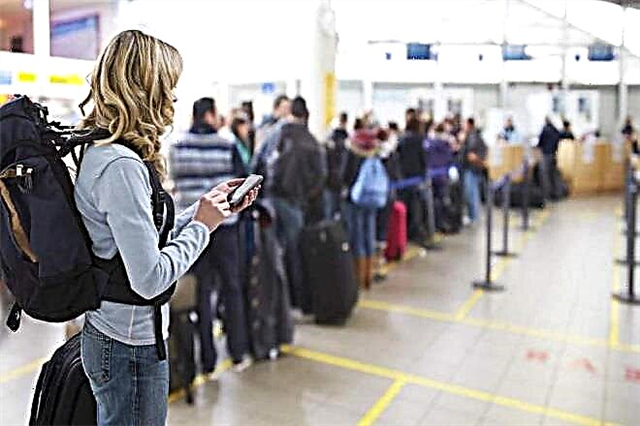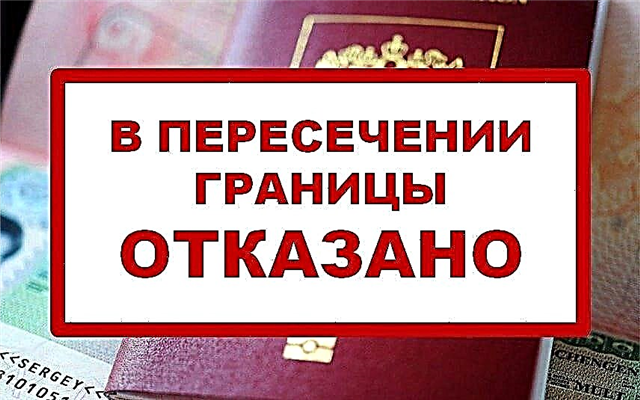Direct or indirect violation of the legislation of the Russian Federation by a foreigner is fraught with the imposition of a ban on entry into the Russian Federation. At the same time, the legislation provides for the possibility of lifting such restrictions.
No entry
The ban on entry is a measure of legal responsibility imposed by the state authorities of the Russian Federation in relation to foreign citizens (as well as stateless persons):
- Previously violating the laws of the Russian Federation (or other countries);
- Whose visit to the Russian Federation poses a potential threat to the Russian people and state.
Restrictions on entry exclude any form of stay in the Russian Federation, regardless of the purpose of the visit and related circumstances. The maximum period of the ban is 10 years, however, it can be extended based on decisions of the competent authorities.
Directly crossing the border of the Russian Federation is prohibited by the state agency whose sphere of authority is the offense of a foreigner (or possible prerequisites for its commission).
Thus, entry may be prohibited:
- Ministry of Foreign Affairs of the Russian Federation:
- Departments of the Ministry of Internal Affairs of the Russian Federation (in particular, the GUVM, which took over the duties of the abolished FMS);
- Other federal departments (in particular - the FSB, SVR and FSIN).
Reasons for overlapping
- Possible (i.e. reasons that only imply the possibility of overlap);
- Unconditional (i.e. the reasons for which the prohibition is inevitable).
Possible grounds
According to Art. 26 of the aforementioned law, entry into the Russian Federation may be prohibited for foreigners:
You May Also Like
- Those who violated the procedure for crossing the Russian border - incl. customs and / or sanitary rules (the ban is lifted after the violation is eliminated);
- Submitting false information about themselves and / or the purpose of entry;
- During past visits to Russia (ban period - 3 years):
- Repeatedly prosecuted under articles of the Code of Administrative Offenses;
- Those who did not leave the country at the end of the established period (the exception is the presence of insurmountable circumstances, for example, due to the illness or death of a Russian relative);
- Members of foreign private organizations, whose activities in the Russian Federation are recognized as undesirable;
- Suspected of conducting extremist, terrorist and / or other illegal activities;
- Whose funds and / or other property were frozen on the basis of the relevant court decision (the ban is lifted when this decision is canceled).

Unconditional reasons
According to Art. 27 of the above law, entry is prohibited to foreigners:
- Used forged documents;
- In respect of whom a decision has been made that their stay in the Russian Federation is undesirable;
- For those who did not submit (the ban is lifted upon elimination of the violation):
- Documents for obtaining a Russian visa;
- OMS policy valid in the Russian Federation (with the exception of the validity of international treaties);
- Confirmation of the availability of funds for accommodation and subsequent departure from the Russian Federation;
- Evidence of the absence of tax or other financial debts that arose during previous visits to the Russian Federation;
- Posing a threat to the state (defense, public order, etc.);
- Those with an unexpunged conviction for acts committed in (or outside) the Russian Federation;
- Previously expelled from the Russian Federation (the ban is imposed for 5 or 10, or 3 years - in case of single and multiple deportations, or voluntary departure, respectively);
- Repeatedly involved within 1 year to liability under the Code of Administrative Offenses for violations of the order, migration or labor legislation of the Russian Federation (ban period - 5 years);
- Those who have exceeded the period of legal stay in the Russian Federation (the ban is imposed for 3, 5 or 10 years - depending on the length of the illegal stay).
Influencing factors
Summarizing the above, we can conclude that the key factor that determines the likelihood of imposing the considered restriction is the law-abidingness of a foreigner, i.e. the degree of compliance with the requirements of the migration, administrative and criminal legislation of the Russian Federation.

However, in a number of situations, a ban may be the result of any other circumstances - from a technical mistake made in the Main Directorate for the Ministry of Internal Affairs to an aggravation of the international political situation.
Ban check
You May Also Like
You can check the ban on entering the Russian Federation:
- Online - through the appropriate form on the GUVM website;
- Contacting the department of the GUVM (by mail or through a legal representative).
In the first case, in order to check the possibility of entry, you must fill out the request form and enter the confirmation code. The required information is presented in real time, but it is purely for reference purposes.
In the second case, a check for a ban on entry into the Russian Federation is carried out through the department of the Main Directorate of Internal Affairs at the place (including the alleged) of the foreigner in the Russian Federation (the list of territorial departments can be found at the link.
A request for information is drawn up in a free form (by analogy with the above request) and is submitted complete with a copy of the foreigner's identity card.
Lifting the ban
The current restriction can only be canceled by the state body (or court) of the Russian Federation responsible for its imposition.
Possible grounds for dispute:
- Revealing previously unaccounted for (and / or new) circumstances;
- Operation of international treaties;
The presence of a foreigner:
- Close relatives of Russians;
- A valid temporary residence permit, residence permit, or other documentary basis for staying in the Russian Federation;
- Other circumstances (for example, the need for emergency treatment in the Russian Federation).
The procedure for lifting the ban includes:
- Obtaining official confirmation from GUVM;
- Preparation and submission of the required documents to the authorized government agency.
Receiving confirmation
The request for confirmation of the imposition of the ban is sent to the Main Directorate of the Ministry of Internal Affairs in the above manner, as a result of which the applicant is issued an official document containing:
- Reason for overlapping (with links to relevant regulations);
- The name of the department (and / or its territorial subdivision) that imposed the ban;
- Overlay date and validity period.
Thus, on the basis of this document, the foreigner receives comprehensive information for subsequent actions.
Preparation of documents
To submit the request in question, an appropriate application is required, as well as originals and copies:
- Passport (or other similar document) of the applicant;
- The documentary basis for lifting the ban, depending on the reason for its imposition (for example, confirmation of the absence of tax arrears);
- Other documents, depending on the circumstances (Russian residence permit, marriage certificate with a Russian, etc.).
All foreign documents are completed with notarized translations. Only official acts issued by Russian or foreign government agencies or other authorized institutions are accepted as grounds.
The aforementioned statement is drawn up in a conditionally free form and contains:
- Addressee (leadership of the territorial body that imposed the ban);
- Sender (full name, address of residence and contact details of the applicant);
- Directly a petition for the removal (revision) of the restriction;
- Applicant Information:
- Full name, valid citizenship;
- Place and date of birth;
- Passport data;
- Requisites:
- Decisions to deny entry;
- Documents-grounds for its withdrawal;
- List of applications;
- Submission date and signature.

Submitting a request
These documents are submitted to the responsible government agency. Due to the invalidity of the FMS regulations, the current regulatory legal acts have not established the time limits for considering such requests.
However, in practice (and in accordance with general procedural rules), reasoned answers are given to the applicants. within 1 month. The official decision of cancellation comes into force. no later than 2 monthsthat have passed since the date of the request.
Appeal through the court
In addition to the considered procedure for lifting the ban (or simultaneously with it), a foreigner can also file a corresponding claim in a court of general jurisdiction operating at the location of the defendant (i.e., the body that imposed the ban). The procedure is the same as above.
A decision on the impossibility of lifting the ban (if any) should also be attached to the package of documents to be submitted. The time frame for such proceedings varies on the average. from 1 to 3 months, since each case is considered on an individual basis.
You can find out about the presence (or absence) of the considered prohibition by contacting the Main Directorate of the Ministry of Internal Affairs, either in person or online. Challenge is possible both in pre- and in court.











